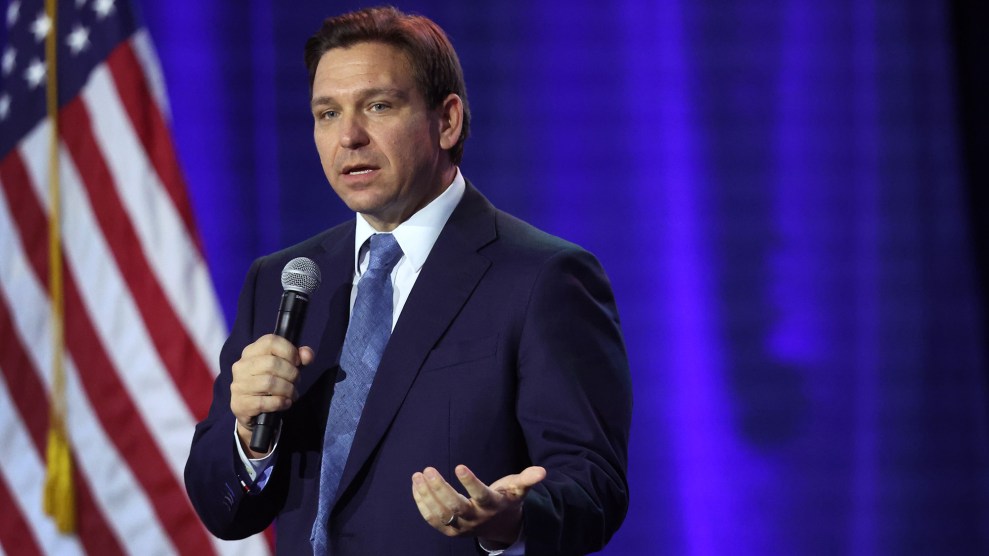
Mother Jones illustration; Adam Schultz/White House/ZUMA
When Florida Governor Ron DeSantis decided to go after Disney last spring for opposing his “Don’t Say Gay” law, he was making it an example. He chose a powerful, high profile target that had disagreed with his policy preferences, and he punished that company for crossing him. In doing so, he sent a clear warning to other companies: Disagree and I will come knocking. If he was willing to attack Disney, one of the state’s largest employers and a major tax source, no business was safe.
This is an authoritarian tactic. Authoritarian leaders use various means to control the private sector to suppress dissent and bring a powerful segment of society under their sway. But in order to make an example of Disney, DeSantis had to be clear that Disney was suffering as a direct result of speaking out against him.
Unfortunately for DeSantis, that kind of retaliation against speech is a violation of the First Amendment. When Disney finally decided to fire back on Wednesday by filing a suit against DeSantis, the governor had spent over a year doing the company the favor by making myriad comments explaining he was seeking revenge against Disney, strengthening its legal hand. As Disney predicted in its complaint, “This is as clear a case of retaliation as this Court is ever likely to see.”
“It is a violation of the First Amendment for the government to punish a corporation because of the company’s expressed viewpoints on political issues,” Adam Winkler, a professor at UCLA School of Law and the author of We the Corporations: How American Businesses Won Their Civil Rights told Mother Jones a year ago when DeSantis first passed legislation targeting Disney for retribution.
As Republican Mitt Romney famously reminded Iowans during his 2012 presidential campaign, “Corporations are people.” And for many legal purposes, he was right. Over the last century, the Supreme Court has extended civil rights to corporate entities, a trend Republicans and the conservative movement generally cheered. In 2010, the Supreme Court granted them the right to spend money to influence elections, ruling that was a form of political speech protected by the First Amendment. In 2014, the justices decided that some corporations also have religious rights.
The expansion of corporate civil rights has had harmful and undemocratic consequences, such as flooding elections with money or allowing businesses to deny reproductive health care to employees. But it has also left corporations with more tools to fight authoritarian meddling. This is what we are seeing now in Florida. “This whole situation highlights one of the hidden benefits of recognizing corporations to have rights,” Winkler explained, “that corporate rights also serve as a check on government tyranny.”
Disney’s suit against DeSantis is replete with examples of DeSantis and his allies being explicit about launching a campaign of revenge over Disney’s political speech. The first step in that retaliation was passage of a law last April to sunset the special tax district that Disney had long enjoyed. “‘You shouldn’t get involved’,” DeSantis once publicly recalled warning the company. “‘It’s not going to work out well for you.'” After Disney released a statement saying it would work to repeal the “Don’t Say Gay” law, DeSantis said the company had “crossed a line,” and vowed “to make sure we’re fighting back.” Disney’s opposition to the law was “a provocation and we are going to fight back against that,” DeSantis said upon signing the legislation.
His allies and staff made the same kinds of bald comments, also cataloged in the company’s court filing. “If Disney wants to embrace woke ideology, it seems fitting that they should be regulated by Orange County,” an aligned lawmaker who supported the bill tweeted. “Disney and other woke corporations won’t get away with peddling their unchecked pressure campaigns any longer,” a DeSantis fundraising email declared. “You kick the hornet’s nest, things come up,” another legislative ally said. A third stated: “Disney is learning lessons and paying the political price of jumping out there.” Christina Pushaw, the governor’s press secretary at the time, put it more bluntly, “Go woke, go broke.”
For DeSantis, retaliating against Disney was a political selling point that helped him build his national profile as he prepared for a likely presidential bid. In his memoir released in February, he dedicates an entire chapter to the affair, entitled “The Magic Kingdom of Woke Corporatism.” He ends the chapter with this lesson: “Leaders must be willing to stand up and fight back when big corporations make the mistake, as Disney did, of using their economic might to advance a political agenda.”
But the triumphant end to DeSantis’s book chapter on Disney was not the end of the dispute. That same month, after technical obstacles emerged, DeSantis and the legislature decided to retain the special tax district but under a new board made up of DeSantis appointees. These lackeys would, DeSantis threatened, use their sway over the company to influence Disney’s content and possibly further retaliate against any unwanted political speech. In essence, he’d hoisted a Sword of Damocles and left it hanging over the company.
To retain its independence, just as the old, Disney-friendly board’s control was sunsetting, the company and the district agreed to a contract that gave Disney control over its theme parks, hamstringing the incoming board. Outmaneuvered, DeSantis and his board allies sought to nullify that agreement. The new board hired multiple lawyers and declared the last-minute contract void. Meanwhile, GOP legislators drafted yet another round of legislation aimed at rolling back Disney’s power play. (They also floated another retaliatory measure, subjecting Disney’s monorail to new state supervision.) While the drama played out in law firms and the legislature, DeSantis continued to be open about his retaliatory intent. Perhaps, as payback, he mused earlier this month, the state would build a prison next to Disney World.
The episode has demonstrated many of DeSantis’ authoritarian traits. His desire to be dominant, even over the private sector; to impose his ideology on Florida, including its businesses; and his refusal to concede defeat. Like Donald Trump, who still contends he won the 2020 election, the worst thing that can happen to a leader who depends on a vision of power to rule is to admit defeat. DeSantis can never show weakness, and so he pushed Disney to the point where the company—so loath to bring a lawsuit that it avoided court for a year—was finally forced to sue to protect its business interests. DeSantis could have scored a publicity win with his conservative base without actually harming Disney’s bottom line and gotten away with it with it—but he wanted actual power over the company.
DeSantis is a Harvard-educated lawyer. He surely knows that retaliation against a corporation for political speech is unconstitutional. Clearly, even as he prepares to seek the White House, he does not think the rule of law should impede his agenda. We’ll soon see soon if the courts agree.

















